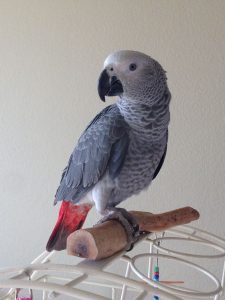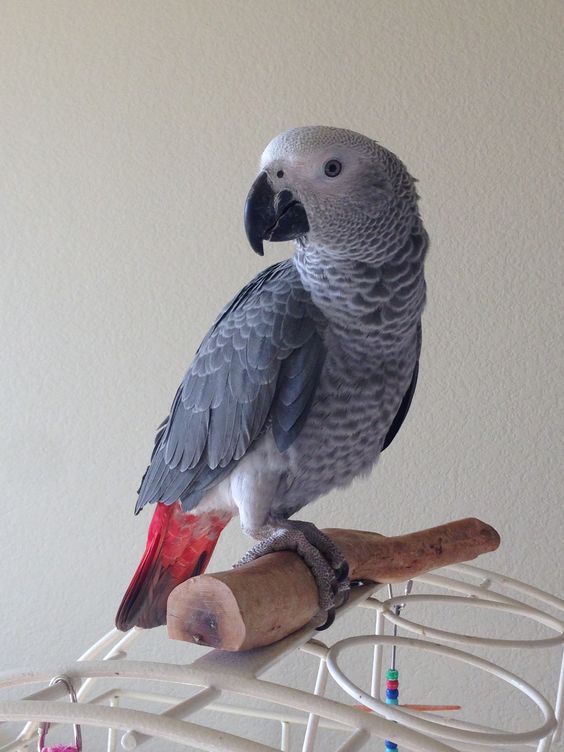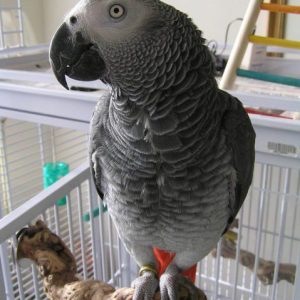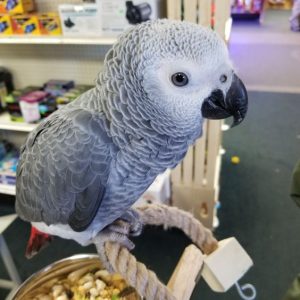African grey parrot for sale-(JACKIE)
African grey parrot for sale-(JACKIE) is a good choice if you like a very inquisitive and intelligent animal. They have a lot of energy and curiosity and are perhaps the smartest species of bird that lives and so will take up a lot of your attention and energy. Because of this, you will need to spend a lot of time with them each day and so they’re not a pet that can be easily left on their own. They are typically around 25 to 35 centimeters and so are larger than the standard pet 
African Grey Parrot Subspecies and Pricing
The search results highlight two primary subspecies of African grey parrots:
- Congo African Grey (Psittacus erithacus erithacus): These are larger, with a lighter grey color and a bright red tail. Prices for Congo African Greys range from $1,000 to $7,500, depending on age, training, and breeder reputation. [1, 2, 3, 4, 5][2][3][4][5]
- Timneh African Grey (Psittacus erithacus timneh): These are smaller, darker in color with a maroon tail and a horn-colored beak. Timneh African Greys are often priced slightly higher than Congo African Greys, ranging from $900 to $4,700. [3, 4, 5][4][5]
Considerations Before Buying
Owning an African grey parrot is a significant commitment. These birds are highly intelligent and require substantial care, including:
- Long-term commitment: African greys can live for 50 years or more, requiring a lifetime of dedication and care. [2, 5][5]
- Social and emotional needs: African greys are social creatures who need regular interaction to stay happy and healthy. Lack of attention can lead to behavioral issues like feather plucking. [2, 5][5]
- Mental stimulation: These intelligent birds need constant mental engagement through toys, language learning, and problem-solving activities. [2, 5][5]
- Space requirements: African greys need a large cage and a safe, bird-proofed area to explore. Their environment should be free from hazards like toxic plants and open water. [2]
- Dietary needs: They require a balanced diet of high-quality pellets, fresh produce, and occasional nuts or seeds. Certain foods, like avocados and chocolate, are harmful. [2, 5][5]
- Veterinary care: Regular vet check-ups are crucial, as African greys are susceptible to health issues like vitamin A deficiency. [2]
Benefits of Owning an African Grey Parrot
Despite the responsibilities, owning an African grey parrot offers numerous benefits:
- Intelligence: They are among the smartest birds, capable of understanding and mimicking human speech, making them engaging and interactive companions. [2, 5][5]
- Emotional bonding: They form deep emotional bonds with their owners, providing a level of companionship comparable to more traditional pets. [2]
- Mental stimulation: Owning an African grey offers a unique opportunity for mental engagement, as these birds enjoy learning new words and tricks. [2]
- Longevity: Their lifespan can exceed 50 years, allowing for a deep, evolving relationship. [2]
- Social interaction: They are social creatures and enjoy being part of family activities, adding liveliness to a household. [2]
- Natural beauty: African greys are visually striking with their grey and red plumage, adding an element of elegance to any environment. [2]
- Health benefits: Caring for a pet like an African grey can reduce stress and improve mental health, offering therapeutic benefits. [2]
Tips for Caring for Your African Grey Parrot
Once you’ve decided to welcome an African grey parrot into your home, here are some essential tips for their care:
- Set up a safe and comfortable space: Prepare a suitable living area with a large cage that allows for movement and stretching wings. Place it in a quiet corner, away from direct sunlight or drafts. [5]
- Establish a routine: Start a consistent routine for feeding, playtime, and rest. African greys respond well to predictability, which helps them adjust to their new environment. [5]
- Initial feeding: Offer a balanced diet from the start, including high-quality pellets, fresh fruits, and vegetables. Gradually introduce new foods to avoid digestive upset. [5]
- Gentle interaction: Initially, interact with your parrot calmly and gently. Let them get used to your presence without forcing physical contact. Speak softly and spend time near the cage. [5]
- Observe behavior: Pay attention to their behavior for signs of stress or discomfort. Initial shyness or nervousness is common, but they should gradually become more comfortable. [5]
- Health monitoring: Keep a close eye on their health. Look out for signs of stress or illness, and be prepared to consult an avian vet if you notice any concerning changes. [5]
- Slow introduction to new spaces: Gradually introduce them to other parts of your home for exploration, ensuring these areas are bird-proofed for safety. [5]
- Build trust: Develop a bond through gentle, consistent interaction. Avoid rushing the process, as trust-building is key to a long and healthy relationship with your African grey. [5]
Conclusion
Owning an African grey parrot is a rewarding experience, but it requires significant commitment and care. Before purchasing, thoroughly research the responsibilities involved and ensure you are prepared to provide a safe, stimulating, and loving environment for these intelligent and emotionally complex birds.
What are the average prices for African grey parrots?
Do you know if there are any breeders in my area?
What are the pros and cons of owning an African grey parrot?






